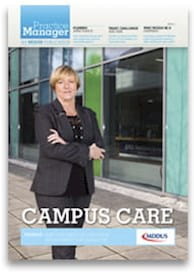GOOD medical practices are very protective of their reputations – and understandably so as this can affect the trust patients place in the care being offered.
MDDUS has in recent years been increasingly contacted by members looking for advice on handling comments or complaints posted on social media sites such as Facebook and Twitter. Many of these posts express unhappiness with the service provided by a practice or an individual clinician or member of the staff team. Some can be personal and malicious and very distressing, as well as frustrating if the comments made are inaccurate or untrue. The situation can be made even worse when other individuals comment or add to the original post.
Posts that are malicious or derogatory in nature, using racist or discriminatory language, may violate the law and it would be reasonable for you to contact the social media site directly and request that the comments be removed. Most social media platforms have a checklist of questions that will be asked before they decide if it is appropriate to remove a comment or part of a post.
You may then wish to contact the patient and let them know that you have become aware that they are unhappy about some aspect of their care and invite them to a meeting to discuss their concerns. Guiding the patient towards the local complaints procedures may allow them the opportunity to voice their concerns directly and provide an opportunity to respond accordingly. It is also always possible that the comments were written by somebody other than the patient.
Be aware that any written communication should be worded carefully and perhaps restricted to an invitation to discuss their concerns. It has been known for patients to post copies of such correspondence on their media site just to back up their claims! Avoid sending warning letters or deregistering patients from the practice list as a result of their comments. GMC guidance is clear that patients should not be deregistered because they have made a complaint or a claim and a full investigation should be made in line with the complaints procedure before any other action is taken.
The GMC issues guidance regarding clinicians and staff and the use of social media sites for learning and teaching. They offer advice on using social media and networking sites responsibly but they do not provide specific guidance on how to respond to comments that are made on networking sites. We also advise that members follow the GMC explanatory guidance regarding confidentiality. Perhaps most applicable in this context is the advice given to doctors who have been criticised by patients in the press.
GMC guidance states: “Although this can be frustrating or distressing, it does not relieve you of your duty to respect your patient’s confidentiality. Disclosures of patient information without consent can undermine the public’s trust in the profession as well as your patient’s trust in you. You must not put information you have learned in confidence about a patient in the public domain without that patient’s express consent.
“Disputes between patients and doctors conducted in the media often serve no practical purpose; they can prolong or intensify conflict and may undermine public confidence in the profession, even if they do not involve the disclosure of personal information without consent.”
Postings on social media tend to be transitory in nature – topics are quickly dropped and forgotten by the patient or individual concerned as they move onto to the next topic of conversation. But they can leave a very bitter taste for those who were the target of the criticism or abuse.
In the past these complaints would have been voiced aloud to anyone who might listen and then usually forgotten. But the advance of technology has meant that they are now available for all who wish to have their say on a subject. Time will show whether new cyber troll laws will make patients think twice before posting comments.
Helen Ormiston is an MDDUS practice adviser and co-editor of Practice Manager
This page was correct at the time of publication. Any guidance is intended as general guidance for members only. If you are a member and need specific advice relating to your own circumstances, please contact one of our advisers.
Read more from this issue of Practice Manager

Save this article
Save this article to a list of favourite articles which members can access in their account.
Save to library